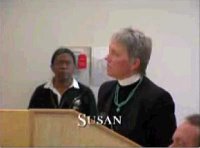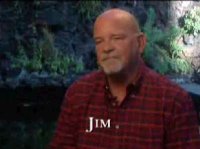The completed transcript of Melvin Lipman's talk at the Humanist Community of Central Ohio's event on Saturday can be found here. |
Monday, July 31, 2006
Completed transcript
Posted by
Renee in Ohio
at
7:34 PM
|
![]()
From the Q and A: Lack of media coverage
Crossposted at My Left Wing, Booman Tribune, and Daily Kos |
Posted by
Renee in Ohio
at
3:05 PM
|
![]()
Sunday, July 30, 2006
Asserting our Humanism, by Melvin Lipman, Part 4
There's a quote attributable to the Jesuits that says, "Give me a child at an impressionable age, and he's mine for life." What about children of Humanists? How do we nurture *their* beliefs the way the churches do? Humanist parents often feel defensive when asked, "What religion do you raise your children in?" The questions themselves offend me. Do we ask every Christian or Jew or Muslim, "What do you teach your kids?" Are *we* expected to raise our children to follow some religion that we, ourselves reject? |
Posted by
Renee in Ohio
at
10:58 PM
|
![]()
Melvin Lipman, Part 3
So, we've come out. What now? How can we be most effective? Well first, by supporting our national, nontheist organizations, so that we can speak with an organized voice. There are enough national organizations in this country to suit everyone's tastes. I proudly belong to every one of those national organizations. And the next step is to get our national organizations to cooperate with each other. The Christian Coalition did it, while each member organization maintained its own identity--why can't our organizations do the same thing? The Humanist lives as if this world were all and enough. He is not otherworldly. He holds that the time spent on the contemplation of a possible afterlife is time wasted. He fears no hell and seeks no heaven, save that which he and others created on earth. He willingly accepts the world that exists on this side of the grave as the place for moral struggle and creative living. He seeks the life abundant for his neighbour as for himself. He is content to live one world at a time and let the next life - if such there may be - take care of itself. He need not deny immortality; he simply is not interested. His interests are here.While the religionists make claims that noone has ever proved, our claims are real. Our claims and our promises have been proven over and over and over. Alternate link for comments |
Posted by
Renee in Ohio
at
3:11 PM
|
![]()
Bumper Sticker Intermission
From Melvin Lipman's talk: Alternate link for comments |
Posted by
Renee in Ohio
at
12:49 PM
|
![]()
Saturday, July 29, 2006
Asserting our Humanism, by Melvin Lipman, cont'd
In 25 years, the Christian right has gone from their self-described "Silent Majority" to the "Moral Majority", and today, to the "Embattled Christians". |
Posted by
Renee in Ohio
at
11:21 PM
|
![]()
Asserting our Humanism, a talk by Melvin Lipman
The American Humanist Association is the largest and the oldest Humanist organization in the United States. We have 114 chapters and affiliates in 46 different states, plus Washington D.C. The purpose of the American Humanist Association is to promote the awareness of Humanism. |
Posted by
Renee in Ohio
at
9:09 PM
|
![]()
Being an atheist in America
Crossposted at Daily Kos "We feel now more than ever there’s a need to assert ourselves to stop this creeping theocracy from taking place, to let the public know that religion has no monopoly on morality," the president of the American Humanist Association said.I don't know that it's perfectly okay to say you "hate" anyone--most Americans, in my experience, anyway, are uncomfortable with people actually *saying* that word--but I do think he has a point that prejudice against atheists is a more "acceptable" prejudice to many Americans. My quick thought on this is that when someone identifies as an atheist, people tend to see that as a rejection of something that is an important foundation they have build their lives around. It feels threatening. What are other people's thoughts about this? Alternate link for comments |
Posted by
Renee in Ohio
at
9:07 AM
|
![]()
Thursday, July 27, 2006
Blogathon
Via Father Jake Stops the World Blogathon?  Alternate link for comments |
Posted by
Renee in Ohio
at
7:38 AM
|
![]()
Wednesday, July 26, 2006
The Right's Values Agenda
A press release by Bob Shemansky. The date on it is July 19, but I haven't opened my e-mail for a few days. It's been a crazy week. -Renee |
Posted by
Guest Blogger
at
7:09 AM
|
![]()
Sunday, July 23, 2006
Katharine Jefferts Schori on CBS Evening News
She was supposed to be on CBS Evening News last Sunday, but was pre-empted for "breaking news". Just as well, I guess, as I was on the road and had no way of recording it. I've transcribed it below, missing only the very beginning (as in, the first few words) of the segment. |
Posted by
Renee in Ohio
at
7:11 PM
|
![]()
Friday, July 21, 2006
Attraction and Christian Marriage
Interesting post at Salt, especially given how much certain "Christian" groups worry about keeping "man-woman marriage" as the only sort of union allowed legal status... Reasserters - those who elevate the 1st century view about the primary utility of genital sex – make a few assumptions about romance and attraction, I think. I’d like to examine a few. Read the rest here. Alternate link for comments |
Posted by
Renee in Ohio
at
7:25 PM
|
![]()
Thursday, July 20, 2006
The problem with Dobson
When I posted about "Dogs don't moo" at Democratic Underground, Democrats_Win shared a pertinent detail that makes the web site make a little more sense--explaining that it is in response to pro-gay campaign ad. The campaign’s star is a puppy named Norman who says “moo” instead of “woof.” Campaign organizers said Norman’s story is a metaphor for gay people.” The Springs are seen nationally as a battleground of social issues,” said Bobby Rauzon, a spokesman for the ad campaign, the Gazette reported. The ads will appear only in Colorado Springs, home to Focus on the Family, an anti-gay conservative Christian group. The idea is to stimulate discussion, said Mary Lou Makepeace, director of the Gay & Lesbian Fund for Colorado, which is based in Colorado Springs and funded by the Gill Foundation.  It is a neat ad. But with this new information, I find the ad even more troubling. It fits a larger pattern that I have seen in people like Dobson--if your very existence flies in the face of the world as they want to see it, you are perceived as a threat. You must be dismissed or explained away. You are disposable. I've written about this before, and this seems like a good time to revisit these issues... I have some pretty strong feelings about Dobson and his kind of Christianity, but before I'd ever heard of his religious views, I had been put off by his views on parenting. I first heard about James Dobson when my kids were younger. Actually, on a particularly challenging outing to the grocery store, a smiling woman in front of me in line handed me a small piece of paper with a book suggestion for me: The New Dare to Discipline by Dr. James Dobson. At that point, I knew enough about Dobson to know that this was her way of saying, "Those kids need to be smacked more often!" I am convinced that our nation's overreliance on punitive "teaching" methods is a big part of our problem...but I will need to address that issue in more detail at another time.
Nice. I don't know of any dog behavior experts who recommend the belt method. Go here and click "Aversives for Dogs" for a PDF listing more humane suggestions. Neither is physical punishment recommended for improving the behavior of children--sure, you will find some, like Dobson, who maintain that it's a good idea. Me? I think I'll listen to the American Academy of Pediatrics before I take his advice. I find Dobson's advice especially troubling because I am the parent of a "strong willed child". It is my belief, both from my experience with my child and what I've read about children with similar characteristics, that Dobson's approach would be counterproductive.
For some kids, this is a recipe for escalation of the problem. Ross Green's concept of the explosive child was very helpful for me in understanding kids like this. And Gordon Neufeld's concept of counterwill affirmed something that I had already suspected. What appears to be "willful behavior" in fact, it reflects an absence of a well integrated self and "will" as well as an environmental experience of being overrun by someone else's will. Kids like this need help learning self-control, coping skills, shifting gears. A while back I watched a video featuring Rick Lavoie, an expert on learning disabled children. He gave an example of a friend of his who has a daughter with a learning disability. When Rick was at the man's house for dinner, the daughter said something inappropriate at the dinner table. After the girl had been sent to her room, he asked (I'm paraphrasing from a sketchy memory here), "If she were doing badly in a sport, would you punish her or coach her?" Rick Lavoie recommends a technique he calls a "social autopsy" as a teaching tool for children with social skills deficits.
|
Posted by
Renee in Ohio
at
10:29 PM
|
![]()
Dogs don't moo=no to domestic partnerships. WTF?
Update: I have just been informed that "No moo lies" is a response to this. James Dobson's Colorado Springs-based ministry stands firmly against same-sex marriage, gay rights initiatives and, now, mooing puppies.Really, people--how does this *affect* you, such that you need to go to such, well, ludicrous lengths to oppose domenstic partnerships in Colorado. Frankly, I think it's just petty and mean. But then again, I'm reminded of what Jesus said about homosexuality. Which was...um... Oh, that's right--he didn't say *anything* about it, did he? But I'm pretty sure I *do* remember him saying something about treating people the way you want to be treated. In more positive, inclusive news, a bishop in Arkansas has indicated that he will allow blessings of same-sex unions in his diocese.  Alternate link for comments |
Posted by
Renee in Ohio
at
5:51 PM
|
![]()
Wednesday, July 19, 2006
Bush's first veto
I received this from the Christian Alliance for Progress today: President Bush followed through with his threat to veto the stem cell bill that Congress sent to him on Tuesday. In the first such veto of his career as an executive at any level of government, his use of that authority will result in the early deaths and unnecessary suffering of millions of Americans. It is one of the most stunning, irrational decisions of an administration with a reputation for such and the most telling piece of evidence yet that America is under the sway of theocrats whose obsession for ideological purity outweighs their concern for America's, and the world's, sick and dying.Learn more about how to get involved in the Christian Alliance for Progress here. Alternate link for comments |
Posted by
Renee in Ohio
at
11:16 PM
|
![]()
Tuesday, July 18, 2006
Catching up
Over at Street Prophets, Pastor Dan somewhat apologetically posted Progressive Faith Blog Convention, Again--starting the post with Okay, I'm going to stop talking about this soon. Real soon. |
Posted by
Renee in Ohio
at
7:37 AM
|
![]()
Monday, July 17, 2006
The strange history of the religious left blog
It was about a year ago that something aggravating happened to all of the blogs I had hosted at Blogspot. I was able to get them all restored, except that the url I'd been using for The Religious Left had been grabbed by someone who wanted to "expose" the lies and hypocrisy of the religious left or some such. He (I think it was a "he") did all of one post, and his "credentials", as I recall, were that he had attended a "gay-friendly" Episcopal church for a number of years. The blogger did not allow comments, but put out a call for contributors. |
Posted by
Renee in Ohio
at
11:12 PM
|
![]()
Voices of Witness (Part 5)
A little more of the Claiming the Blessing Voices of Witness video |
Posted by
Renee in Ohio
at
4:19 PM
|
![]()
Progressive Faith Blogger Convention
The Progressive Faith Blog Con has come and gone. You can read about it here. |
Posted by
Renee in Ohio
at
12:30 PM
|
![]()
War and Peace in the Middle East (from Tikkun)
Received via e-mail from our local group, Faith Communities Uniting for Peace... The people of the Middle East are suffering again as militarists on all sides, and cheerleading journalists, send forth missiles, bombs and endless words of self-justification for yet another pointless round of violence between Israel and her neighbors. For those of us who care deeply about human suffering, this most recent episode in irrationality evokes tears of sadness, incredulity at the lack of empathy on all sides, anger at how little anyone seems to have learned from the past, and moments of despair as we once again see the religious and democratic ideals subordinated to the cynical realism of militarism. Meanwhile, the partisans on each side, content to ignore the humanity of “the Other,” rush to assure their constituencies that the enemy is always to blame. Each such effort is pointless. We have a struggle that has been going on for over a hundred years. Who tosses the latest match into the tinder box matters little. What matters is how to repair the situation. The blame game only succeeds in diverting attention from that central issue. Within the context of blame, there’s enough to go around. It all depends on where you start the story.More here. Similar sentiments are very well expressed in the Kos diary by poemless, I don't care why.
Alternate link for comments |
Posted by
Renee in Ohio
at
10:20 AM
|
![]()
Thursday, July 13, 2006
Transcripts
Posted by
Renee in Ohio
at
12:00 PM
|
![]()
Beginnings
Although this particular blog started only a year ago (long story), I first went online with a religious left blog about three years ago. Here's a link to the "About this site" page if you're interested in how this site first came about. |
Posted by
Renee in Ohio
at
11:46 AM
|
![]()
Presiding Bishop Griswold's Word to the Church
Thank you Susan at An Inch at a Time for pointing out the latest from the current Presiding Bishop Frank Griswold On the "two-tier communion concept:" I note here that a two-tier solution to our present strains raises serious questions about how we understand ourselves as being the church. I am put in mind of Paul's understanding of the church as the body of Christ of which we are all indispensable members in virtue of our baptism. I think as well of Jesus' declaration in the Gospel of John that he is the vine and we are the branches and that apart from him we can do nothing. Such a two-tiered view of our common life suggests to me amputated limbs and severed branches without any life-giving relationship to the One who is the source of all life. A pragmatic solution in this regard is at the expense of the deeper truth that the eye cannot say to the hand, I have no need of you. More here. Alternate link for comments |
Posted by
Renee in Ohio
at
11:41 AM
|
![]()
Wednesday, July 12, 2006
Diocese of Southern Ohio announces nominees
I received this via e-mail this morning. During the 129th Diocesan Convention, Bishop Herbert Thompson Jr. called for the election of the Ninth Bishop of Southern Ohio. Because of the Covenant Statement released by the House of Bishops in mid-March, 2005, the Diocese of Southern Ohio re-scheduled its electing convention to Nov. 11, 2006. Consecration is slated for April 2007. Click here to read more about the Covenant Statement. Bishop Thompson retired at the end of 2005. Bishop Kenneth L. Price is the ecclesiastical authority for the diocese.I haven't yet had the chance to read about these nominees for Presiding Bishop in my diocese, but here are the links for anyone who is interested in learning more. Nominees for the Ninth Bishop of Southern Ohio Read the nominees' answers to experience questions posed by the Nominating Committee (PDF) Read the nominees' answers to questions about the wider church posed by the Standing Committee (PDF) Alternate link for comments |
Posted by
Renee in Ohio
at
10:20 AM
|
![]()
Riverbend's latest
For anyone who doesn't know this, Riverbend is a woman who lives in Iraq and posts from time to time about the living situation there. It promises to be a long summer. We're almost at the mid-way point, but it feels like the days are just crawling by. It's a combination of the heat, the flies, the hours upon hours of no electricity and the corpses which keep appearing everywhere. Click for the rest. It's not pretty, which I suppose is why we don't hear about these things in the news much. Alternate link for comments |
Posted by
Renee in Ohio
at
9:46 AM
|
![]()
Tuesday, July 11, 2006
Pastor Dan interviews Barack Obama
From Street Prophets... |
Posted by
Renee in Ohio
at
10:48 PM
|
![]()
This and that
I've gotten caught up in posting about other things today, mostly the Joe Lieberman, but I wanted to swing by this blog and post a couple links before heading out on some errands with Daughter in Ohio. |
Posted by
Renee in Ohio
at
2:05 PM
|
![]()
Monday, July 10, 2006
Sunday, July 09, 2006
This blog isn't ALL Anglican Communion all the time
I've just figured out, from the comment to the post below, as well as some other clues, that some people are coming to this blog for the first time after seeing the CBS segment on the religious left. It occurs to me that one would have to dig pretty deep to find much here that *isn't* about the Episcopal church, the Anglican Communion, or General Convention. I just wanted to say that that's not normally the case, but General Convention only happens every three years, and it actually came to the *city where I live* not long after I was officially received into the church. How often does *that* happen? |
Posted by
Renee in Ohio
at
11:35 PM
|
![]()
CBS covers the "religious left"
In response to Oscar's post Living the Testimony (when time permits, Oscar posts a Word for the Week at Howard-Empowered People) Sharon posted |
Posted by
Renee in Ohio
at
8:17 PM
|
![]()
On moratorium and marriage
From Katharine Jefferts Schori's interview on Oregon Public Broadcasting |
Posted by
Renee in Ohio
at
3:07 PM
|
![]()
More from the Oregon Public Broadcasting interview
Christy George mentioned the issue of gay marriage and having an openly gay bishop as driving the current conflict in the Anglican Communion, and asked, "Is this the big bottom line issue for people?" |
Posted by
Renee in Ohio
at
12:49 PM
|
![]()
Saturday, July 08, 2006
Katharine Jefferts Schori on the roots of the church
More from the interview Presiding Bishop Elect Katharine Jefferts Schori did on Oregon Public Broadcasting. |
Posted by
Renee in Ohio
at
6:40 PM
|
![]()
Walk humbly
Oh, and as I mentioned yesterday, we did set up an e-mail address for bumper sticker/graphics requests. It's graphics (at)bmgbiz.net. Here's the link to my transcript of part of the interview Katharine Jefferts Schori did yesterday for Oregon Public Radio. I plan to post more of it later this weekend. If you're looking for the parts of the Diane Rehm show I transcribed, you can find them here. Alternate link for comments |
Posted by
Renee in Ohio
at
3:13 PM
|
![]()
Katharine Jefferts Schori on OPB's Oregon Territory
Just found out about another radio interview Katharine Jefferts Schori did. It's shorter, and covers some different ground. This is from the second half... |
Posted by
Renee in Ohio
at
11:00 AM
|
![]()























